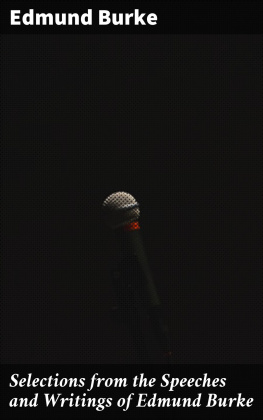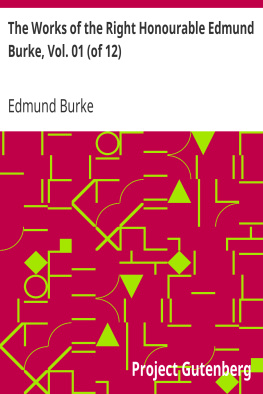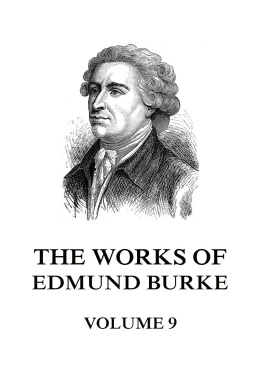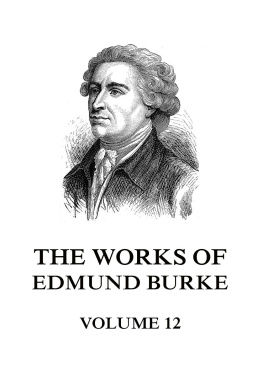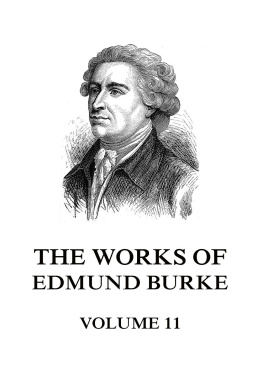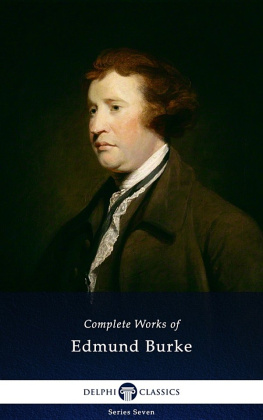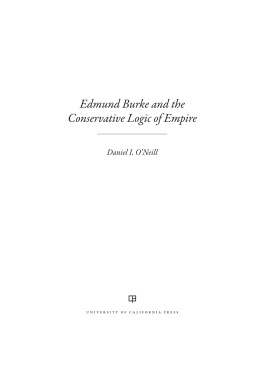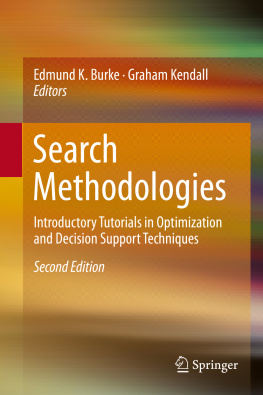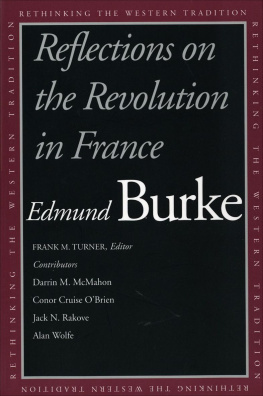INTRODUCTORY ESSAY.
Table of Contents
Table of Contents
"Id dico, eum qui sit orator, virum bonum esse oportere. In omnibus quae dicit tanta auctoritas inest, ut dissentire pudeat; nec advocati studium, sed testis aut judicis afferat fidem."Quintilianus.
"Democracy is the most monstrous of all governments, because it is impossible at once to act and control; and, consequently, the Sovereign Power is then left without any restraint whatever. That form of government is the best which places the efficient direction in the hands of the aristocracy, subjecting them in its exercise to the control of the people at large."Sir James Mackintosh.
Table of Contents
The intellectual homage of more than half a century has assigned to Edmund Burke a lofty pre-eminence in the aristocracy of mind, and we may justly assume succeeding ages will confirm the judgment which the Past has thus pronounced. His biographical history is so popularly known, that it is almost superfluous to record it in this brief introduction. It may, however, be summed up in a few sentences. He was born at Dublin in 1730. His father was an attorney in extensive practice, and his mother's maiden name was Nogle, whose family was respectable, and resided near Castletown, Roche, where Burke himself received five years of boyish education under the guidance of a rustic schoolmaster. He was entered at Trinity College, Dublin, in 1746, but only remained there until 1749. In 1753 he became a member of the Middle Temple, and maintained himself chiefly by literary toil. Bristol did itself the honour to elect him for her representative in 1774, and after years of splendid usefulness and mental triumph, as an orator, statesman, and patriot, he retired to his favourite retreat, Beaconsfield, in Buckinghamshire, where he died on July 9th, 1797. He was buried here; and the pilgrim who visits the grave of this illustrious man, when he gazes on the simple tomb which marks the earthly resting place of himself, brother, son, and widow, may feelingly recall his own pathetic wish uttered some forty years before, in London:"I would rather sleep in the southern corner of a little country churchyard, than in the tomb of the Capulets. I should like, however, that my dust should mingle with kindred dust. The good old expression, 'family burying-ground,' has something pleasing in it, at least to me." Alluding to his approaching dissolution, he thus speaks, in a letter addressed to a relative of his earliest schoolmaster:"I have been at Bath these four months for no purpose, and am therefore to be removed to my own house at Beaconsfield to-morrow, to be nearer a habitation more permanent, humbly and fearfully hoping that my better part may find a better mansion." It is a source of deep thankfulness for those who reverence the genius and eloquence of this great man, to state, that Burke's religion was that of the Cross, and to find him speaking of the "Intercession" of our Redeeming Lord, as "what he had long sought with unfeigned anxiety, and to which he looked with trembling hope." The commencing paragraph in his Will also authenticates the genuine character of his personal Christianity. "According to the ancient, good, and laudable custom, of which my heart and understanding recognise the propriety, I BEQUEATH MY SOUL TO GOD, HOPING FOR HIS MERCY ONLY THROUGH THE MERITS OF OUR LORD AND SAVIOUR JESUS CHRIST. My body I desire to be buried in the church of Beaconsfield, near to the bodies of my dearest brother, and my dearest son, in all humility praying, that as we have lived in perfect unity together, we may together have part in the resurrection of the just." (In the "Epistolary Correspondence of the Right Hon. Edmund Burke and Dr. French Laurence", Rivingtons, London, 1827), are several touching allusions to that master-grief which threw a mournful shadow over the closing period of Burke's life. In one letter the anxious father says, "The fever continues much as it was. He sleeps in a very uneasy way from time to time?-but his strength decays visibly, and his voice is, in a manner, gone. But God is all-sufficientand surely His goodness and his mother's prayers may do much" (page 30). Again, in another communication addressed to his revered correspondent, we find a beautiful allusion to his departed son, which involves his belief in that most soothing doctrine of the Churcha recognition of souls in the kingdom of the Beatified. "Here I am in the last retreat of hunted infirmity; I am indeed 'aux abois.' But, as through the whole of a various and long life I have been more indebted than thankful to Providence, so I am now singularly so, in being dismissed, as hitherto I appear to be, so gently from life, AND SENT TO FOLLOW THOSE WHO IN COURSE OUGHT TO HAVE FOLLOWED ME, WHOM, I TRUST, I SHALL YET, IN SOME INCONCEIVABLE MANNER, SEE AND KNOW; AND BY WHOM I SHALL BE SEEN AND KNOWN" (pages 53, 54).
In reference to the intellectual grandeur, the eloquent genius, and prophetic wisdom of Burke, which have caused his writings to become oracles for future statesmen to consult, it is quite unnecessary for contemporary criticism to speak. By the concurring judgment, both of political friends and foes, as well as by the highest arbiters of taste throughout the civilized world, Burke has been pronounced, not only "primus inter pares," but "facile omnium princeps." At the termination of these introductory remarks, the reader will be presented with critical portraitures of Burke from the writings and speeches of men, who, while opposed to him in their principles of legislative policy, with all the chivalry and candour of genius paid a noble homage to the vastness and variety of his unrivalled powers. Meanwhile, it may not be presumptuous for a writer, on an occasion like the present, to contemplate this great man under certain aspects, which, perhaps, are not sufficiently regarded in their DISTINCTIVE bearings on the worth and wisdom of his character and writings. We say "distinctive," because the eloquence of Burke, beyond that of all other orators and statesmen which Great Britain has produced, is featured with expressions, and characterised by qualities, as peculiar as they are immortal. So far as invention, imagination, moral fervour, and metaphorical richness of illustration, combined with that intense "pathos and ethos," which the Roman critic describes ("Huc igitur incumbat orator: hoc opus ejus, hic labor est; sine quo caetera nuda, jejuna, infirma, ingrata sunt: adeo velut spiritus operis hujus atque animus est IN AFFECTIBUS. Horum autem, sicut antiquitus traditum accepimus, duae sunt species: alteram Graeci pathos vocant, quem nos vertentes recte ac proprie AFFECTUM dicimus; alteram ethos, cujus nomine (ut ego quidem sentio) caret sermo Romanus, mores appellantur."Quintilian, "Instit. Orat." lib. vi. cap. 2.) as essential to the true orator, are concerned, the author of "Reflections on the French Revolution," and "Letters on a Regicide Peace," is justly admired and appreciated. Moreover, if what we understand by the "sublime" in eloquence has ever been embodied, the speeches and writings of Burke appear to have been drawn from those five sources ("pegai") to which Longinus alludes. In the 8th chapter of his fragment "On the Sublime," he observes, that if we assume an ability for speaking well, as a common basis, there are five copious fountains from whence sublimity in eloquence may be said to flow; viz.


